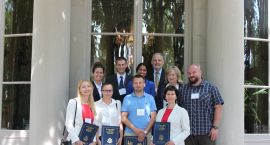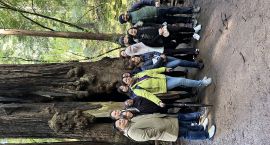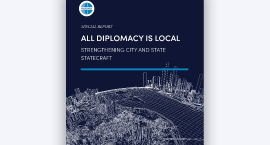Entrepreneurship and innovation are key indicators of a community’s capacity to: grow its economy; develop its workforce; create a diversified workplace; develop leadership skills among its citizenry; and facilitate civic engagement. Entrepreneurship is a tremendous tool for engaging young people, particularly in underserved communities, by helping them develop the skills necessary to compete in the 21st century economy.
Tech entrepreneurship can open up potentially broader opportunities for partnerships with other community stakeholders. Numerous organizations – international, national and local – have focused their resources on developing tech entrepreneurship programs in partnership with educational institutions, businesses and government entities.
Developing International Visitor Leadership Programs on tech entrepreneurship can lead to the discovery of community resources in surprising places, where innovation and cutting-edge initiatives are defining the future. When designing such programs, it is important to include:
Government:
- The federal Small Business Administration (SBA) regional offices, and its affiliated Small Business Development Centers (SBDC, often located on community college campuses)
- State and local economic development agencies, many of which support entrepreneurship programs and incubators
- Public libraries, which provide free and open access to technology
- Public programs to support youth, women and minorities, especially those in underserved and/or low-tech or no-tech environments.
Private sector:
- Regional and local economic development corporations, excellent examples of public/private partnerships focused on innovation and job growth
- Venture Capital firms that focus on new and innovative technologies
- Regional, local, and specialized chambers of commerce and their entrepreneurship programs
- Small and medium-sized business owners or senior managers in a range of sectors, including the arts, retail, service, and culinary, among others
- Maker and open-spaces, collaborative high-tech to no-tech work spaces inside a school, library or separate public/private facility for making, learning, exploring and sharing
- Private sector efforts to promote and support youth, women and minorities, especially those in underserved and/or low-tech environments.
Academia:
- University entrepreneurship and STEAM programs, specialized incubators, and partnerships with business and government
- Community college programs and campus-based incubators
- Tech-focused elementary and high schools
- Sponsored science and tech contests that engage students in finding innovative solutions to community problems
New resources for tech entrepreneurship are continually emerging and developing. While just a few years ago maker spaces were a novelty, today they are commonly found in communities large and small. To make sure that local program schedules include meetings with individual entrepreneurial enterprises, programmers can make useful connections through related institutions such as EO (Entrepreneurs Organization), local chambers of commerce or university research departments that often host new tech businesses. As a critical element in economic development worldwide, tech entrepreneurship will continue to be a common IVLP programming theme. The itineraries we create offer ideas, connections and innovative models for business development that can have far reaching effects in the participants’ home countries.
The International Visitor Leadership Program is sponsored by the U.S. Department of State with funding provided by the U.S. Government and supported in its implementation by Meridian International Center.
















